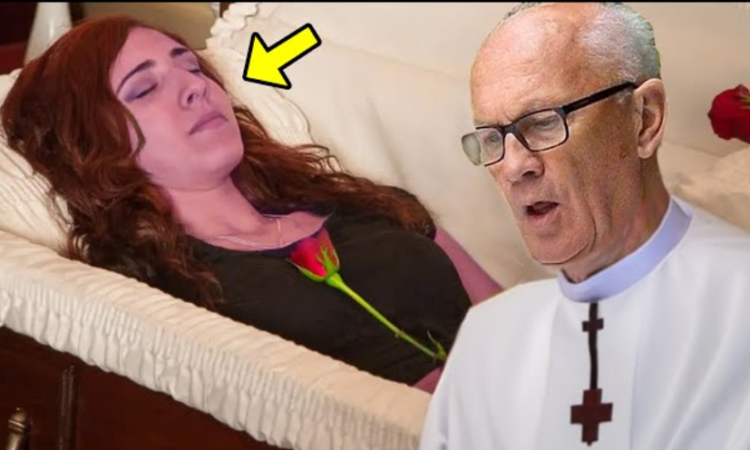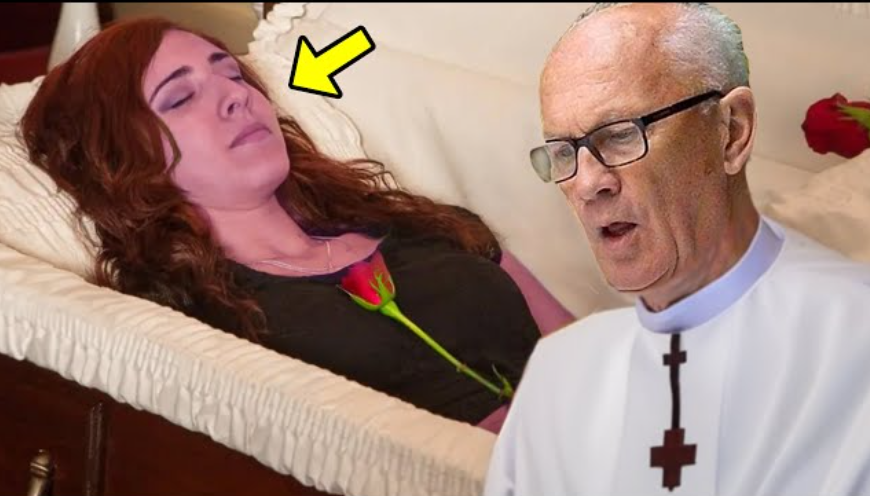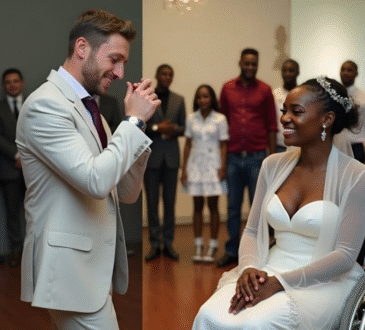
During the memorial service, Father Gabriel notices something strange. He’s been a priest for 20 years, and this is the first time something has disturbed him so profoundly during a funeral. Then he has no choice but to quickly stop the funeral.
It all started early on a Saturday morning. The scent of Lily was overpowering, the clawing sweetness clung to the back of Father Gabriel’s throat. Muffled sobs and murmured prayers filled the chapel. Father Gabriel had presided over more funerals than he cared to remember, but today something pricked at him. There was a persistent unease he couldn’t shake.
Margaret Ellis had been a parishioner for some 20 years. She was a quiet woman, polite and unassuming. Her death was unsurprising, as she had been ill for a long time. He had visited her in hospice and offered communion a week before, and now here she was. Gabriel glanced over the eulogy notes scrolled on his index card; they were standard words of solace and promises of eternal rest.
He usually found comfort in the ritual, but as he opened his mouth to start, he froze. Margaret Ellis’s finger twitched. Had he imagined it? Maybe it had been a trick of the light or a shadow from the flickering candles. He closed his eyes and took a breath. No, there it was again, a slight, unmistakable movement. The eulogy crumbled in his hand; a strangled gasp escaped his lips; he couldn’t speak.

The scent of Lily was suddenly suffocating; there was a ripple of confusion in the congregation, too. An elderly woman whispered urgently to her companion; several heads turned; they had also seen it. Father Gabriel cleared his throat; his voice trembled. Had Margaret Ellis’s eyelids twitched just the slightest flutter? His hands shook as he clasped them together in prayer; his words caught in his throat; his faith suddenly felt fragile. With lean feet, Gabriel moved away from the pulpit and slowly descended the altar steps; each creak of the old wood floorboards echoed like a drumbeat in his ears. The murmurs escalated, and the air thickened with a potent mix of fear and the tremor of impossible hope.
Approaching the casket, he noticed the funeral director, Mrs. Carmichael, toeing nearby; her eyes were wide, and her usually composed expression was now frantic. He reached out cautiously; the fingers of his right hand hovered above Margaret Ellis’s wrist. “This is madness,” he thought. Then, beneath his fingertips, a pulse, faint they, but unmistakably there. He turned to the congregation, lifted both hands, and stopped the funeral. “Call an ambulance,” it was Mrs. Carmichael’s voice. Paramedics arrived within minutes; the crowd parted for them like a wave before a ship. There were glimpses of oxygen masks and flashing monitors; the air crackled with a desperate energy. “She’s alive!” someone shouted; the words reverberated around the sanctuary, followed by a wave of sobs and confused shouts.
Margaret Ellis, certified dead many hours ago, was rushed to the hospital. She remained in a coma, her condition critical but miraculously stable. Father Gabriel stood alone amid the abandoned funeral; had he witnessed a miracle? Some kind of divine intervention, perhaps, or was there a less holy explanation? The question throbbed in his head; his faith had always been his bedrock, but now it was like quicksand beneath his feet. He was simultaneously strengthened and utterly shaken.
In the days following the impossible events at the church, Father Gabriel was drawn to investigate. The police had been summoned by the hospital; it was their job to determine how a declared death had been so catastrophically wrong. At the hospital, they were conducting interviews when Father Gabriel arrived. Doctors, nurses, and even the mortician who had prepared Margaret’s body were waiting for the detectives to call them in.
The mistake, it seemed, wasn’t malevolent; it had simply been an alarming confluence of misjudgments and oversights. Or so they thought. Father Gabriel was ushered into a sterile police interview room. Inside was Margaret’s son, Edward Ellis; his expression was a mask of carefully cultivated grief and a hint of irritation at the inconvenience of it all. He was dismissive when Father Gabriel offered condolences, and he implied immediately that he and his mother weren’t close. He hadn’t seen her for the longest time; his whole attitude was akin to a sneer.
His young sister, Claire Ellis, arrived a few minutes later. The contrast was stark; she had a haunted air of fragility around her. In her hands, she gripped a crumpled tissue, and when Father Gabriel spoke to her, she avoided eye contact. Claire was a bundle of raw nerves; she flinched from questions and choked her words out between sobs. Beneath the devastation, Father Gabriel sensed the tremor of something else; it looked like anger to him, or perhaps fear. He wasn’t sure yet.
An hour later, he popped in to see Margaret; she was unconscious and connected to a whole wall full of machines. He prayed for her, held her hand for a spell, and then left. From the hospital, Father Gabriel headed to Margaret’s home. Inside, the unspoken whispered loudly to Gabriel; the worn armchair was angled away from the TV.
Margaret spent her evenings alone; the refrigerator was almost empty. Family photos showed Claire’s smile growing strained over the years. Then, as he spoke to the neighbors, discrepancies emerged. Edward had downplayed recent visits to his mother; he had told Father Gabriel he hadn’t seen her for ages, yet one neighbor swore she’d seen him leaving the house just two days before Margaret’s so-called death. When Father Gabriel spoke to Claire a second time, she hesitantly admitted to arguments; they were about finances, she said, and they were worse.
Gabriel wasn’t one for conspiracy theories, and he seldom became suspicious, but now the feeling inside was a mixture of both; it was as thick and oppressive as the scent of those lies had been. There was more to this feel than met the eye; darkness lurked beneath the surface of their strained grief. He decided, but with the hospital’s begrudging cooperation, he gained access to Margaret’s records.
Later that evening, he sat in the rectory office with Margaret Ellis’s medical file spread out on his desk; he poured over medication lists and cross-referenced doses with nurses’ logs. Subtle inconsistencies surfaced; there were missed doses of a critical heart medication. These had been replaced with a slightly higher dosage of a sedative often prescribed for insomnia. The implications were chilling; it wasn’t a botched death declaration. This could be attempted murder, slow and insidious.
Then, there was a note about a will revision, hastily executed in the hospital just a week before her collapse. Claire, the devoted daughter, was now the sole beneficiary; Edward, the distant son, stood to lose everything. The weight of the implication nearly crushed them. For Father Gabriel, his duty as a priest was sacrosanct; he upheld the sanctity of confession and the promise of secrecy under all circumstances. But now, those vows warred with the very core of his moral code. If all the pandemonium happened because of an inheritance and an adjusted will, Margaret Ellis, a whisper of a woman he barely knew, could be still in danger.
But Father Gabriel had another tool in his kit: faith. And now, in certainty and his gut told him this wasn’t simply about greed but about a darkness that went beyond money. Confidentiality was a shield, a protection, but what if he used it as a weapon? The idea solidified slowly; separate visits and veiled confessions masked the spiritual counseling that would be his way forward. He would face Edward and Claire alone this time, not as a priest bound by silence, but as a man driven by a higher purpose. He would test their reactions, watch their eyes, and listen for any telltale slip within their grief.
There was a risk, of course; his suspicions could be misplaced, and his meddling might well become disastrous. Yet, as he knelt in prayer that night, it wasn’t forgiveness he asked for; he asked for courage. He wanted the bravery to play a dangerous game where the stakes were a woman’s life and just maybe the salvation of a very tarnished soul.
Father Gabriel arranged the first meeting in the side chapel. Claire Ellis sat alone in a pew; she trembled as she waited for him; her grief seemed to have intensified, and deep shadows ringed her eyes. He told her about his concerns that Margaret’s life might still be in danger. Claire’s eyes widened; her hand flew to her mouth; she stifled a sob. Gabriel saw the moment her resolve crumbled; her story spilled out in a torrent of whispered confessions.
It was about years of emotional manipulation and Edward’s slow siphoning of Margaret’s finances. Then there was the constant belittling that reduced the once-vibrant woman to a ghost of herself. According to her, Edward convinced Margaret she was losing her mind; she began to believe she really was as forgetful as he told her she was. When Father Gabriel told her about the discrepancies he’d found in her medication, she nodded slowly; she thought she was just being paranoid, she said, but it had happened before.
The pieces clicked into place with sickening clarity; Edward’s indifference wasn’t just apathy, it was the arrogance of someone who believed he’d gotten away with it. A few days later, Gabriel got to speak to Edward Ellis on a bench in the park. When he spoke, there was no kindness in his voice, no trace of his usual priestly compassion.
“Your mother is awake, Edward,” he said, “and the police are building a case.” Edward scoffed, but a muscle twitched in his jaw. “Awake?” he said, “so the old bat refuses to kick the bucket. She’s not going to live forever, you know.” Edward’s contempt disgusted Father Gabriel. He told Edward he suspected he manipulated and isolated his mother and that he believed he tried to kill her to prevent the new will from seeing the light.
These comments cracked Edward’s veneer of nonchalance; there was a flicker of rage, which he quickly suppressed but not quick enough. Father Gabriel had noticed. Edward told the priest he’d watched too many crime shows and that he had no proof of anything. He was right, of course, but in that chilling moment, Gabriel saw the true nature of the man before him. Edward was utterly convinced of his untouchability.
For nights after the confrontation, sleep eluded Father Gabriel; the face of Edward Ellis, that mask of smug indifference, haunted his dreams. The police were meticulous but slow, bound by laws and procedures in their hunt for tangible proof. He, on the other hand, was driven by something far more visceral.
Then, like a bolt of lightning, a fleeting memory surfaced; it was his last visit to Margaret’s apartment. He’d been there to offer communion; the holy wafer rested on her frail palm, and her hand—it had trembled. A sick woman’s tremor, perhaps, or something else. An unshakable certainty washed over him; he needed to go back to the apartment.
By the time Father Gabriel arrived at the apartment, the police had meticulously combed through everything. He moved methodically at first, guided by instinct more than any real plan. The worn furniture, the half-finished crossword on the table—these were mundane details that whispered of a quiet life uninterrupted.
Then, he saw Margaret’s old sewing machine tucked into a corner; on a whim, he lifted the lid. Thread, needles, scraps of fabric—and there, nestled beneath a floral remnant, a small worn notebook. His hands shook as he opened it; the pages were filled with Margaret’s handwriting, sometimes neat, sometimes a desperate scrawl. It was her diary, a hidden testament to her misery.
Dated entries detailed Edward’s escalating control; she wrote about the vanished funds, the arguments she was too intimidated to fully remember, and worst of all, she remembered those fleeting moments of terrifying clarity when she suspected what was really happening. Each word was like a hammer blow to Gabriel; she’d been reaching out all along in whatever small ways she could.
He’d seen the plea in her eyes, the trembling hand, and doubted himself; this tiny and assuming diary was both proof and accusation. In the final entry, dated just days before her collapse, there was a desperate plea: “I think Edward is trying to kill me. I must hide this. If something happens, this is the truth.”
Father Gabriel marched into the police station; in his hand, he clutched Margaret’s diary like a lifeline. The detectives were resigned to his frequent presence and barely glanced up from their desks. But when he placed the worn notebook in front of them, the change in the room was palpable. He recounted the discovery; the diary was explosive, meticulous in its documentation, and heartbreaking in its vulnerability. It wasn’t just proof of Edward’s financial abuse; it laid bare his chilling premeditation. This wasn’t a crime of the moment; it was a calculated, drawn-out attempt to erase a life that had become inconvenient.
Edward Ellis’s arrest was shockingly swift; his bravado crumbled when he was presented with his mother’s own words. Here he was, confronted with irrefutable proof of his monstrous scheme, and he couldn’t find words to defend himself. News traveled fast at the hospital; Claire wept with a strange mixture of joy and grief as she held her grandmother’s hand. Margaret remained weak; her recovery was slow, but her eyes saw a sparkle of defiance that hadn’t been there before. With Claire’s unwavering support and the team of fiercely protective doctors, she knew she wasn’t alone anymore. Edward Ellis faced a litany of charges: attempted murder, fraud, elder maltreatment. The trial was swift; the verdict, vindication.
Margaret was frail but unbowed; she testified from her hospital bed. Even though her voice was soft, her words carried the weight of a thousand storms. Justice, she discovered, could be agonizingly slow in its arrival, but arrive it did, and often like a bolt of lightning. Months later, another hush fell upon Our Lady of Perpetual Help; this time, the scent of Lily was gentle, a sweet reminder rather than an oppressive miasma. Margaret Ellis had passed away peacefully in her sleep.
This funeral was different; it was filled with quiet sorrow, yes, but also with a warmth that had been absent before. Claire’s tall grief was etched onto her face, but she was surrounded by true friends and the newfound support of an extended family. Father Gabriel’s hands didn’t shake as he delivered the eulogy; this time, when he spoke of Margaret’s quiet strength, of unwavering faith, his words carried a certainty he hadn’t possessed weeks ago. He had not simply presided over a funeral; he’d been a catalyst, an instrument in a battle against a profound kind of evil.
As mourners approached the casket for a final farewell, a familiar flicker caught Gabriel’s eye. But this time, it wasn’t fear that seized him, but a quiet sense of rightness. A strand of Margaret Ellis’s silver hair fluttered in a gentle draft; it was a whisper of movement amidst perfect stillness. Some might call it a trick of the light, a final illusion. Father Gabriel knew better; it was a goodbye.




